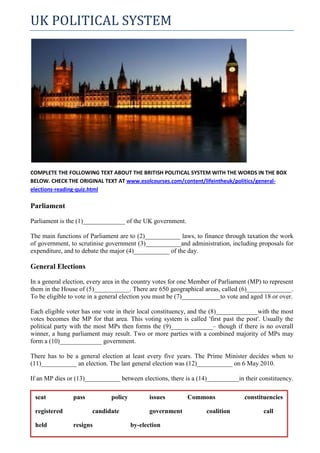Uk political system
- 1. UK POLITICAL SYSTEM COMPLETE THE FOLLOWING TEXT ABOUT THE BRITISH POLITICAL SYSTEM WITH THE WORDS IN THE BOX BELOW. CHECK THE ORIGINAL TEXT AT www.esolcourses.com/content/lifeintheuk/politics/general- elections-reading-quiz.html Parliament Parliament is the (1)_____________ of the UK government. The main functions of Parliament are to (2)___________ laws, to finance through taxation the work of government, to scrutinise government (3)___________and administration, including proposals for expenditure, and to debate the major (4)___________ of the day. General Elections In a general election, every area in the country votes for one Member of Parliament (MP) to represent them in the House of (5)___________. There are 650 geographical areas, called (6)______________. To be eligible to vote in a general election you must be (7)____________to vote and aged 18 or over. Each eligible voter has one vote in their local constituency, and the (8)_____________with the most votes becomes the MP for that area. This voting system is called 'first past the post'. Usually the political party with the most MPs then forms the (9)_____________– though if there is no overall winner, a hung parliament may result. Two or more parties with a combined majority of MPs may form a (10)_____________ government. There has to be a general election at least every five years. The Prime Minister decides when to (11)___________ an election. The last general election was (12)___________ on 6 May 2010. If an MP dies or (13)___________ between elections, there is a (14)__________in their constituency. seat pass policy issues Commons constituencies registered candidate government coalition call held resigns by-election
